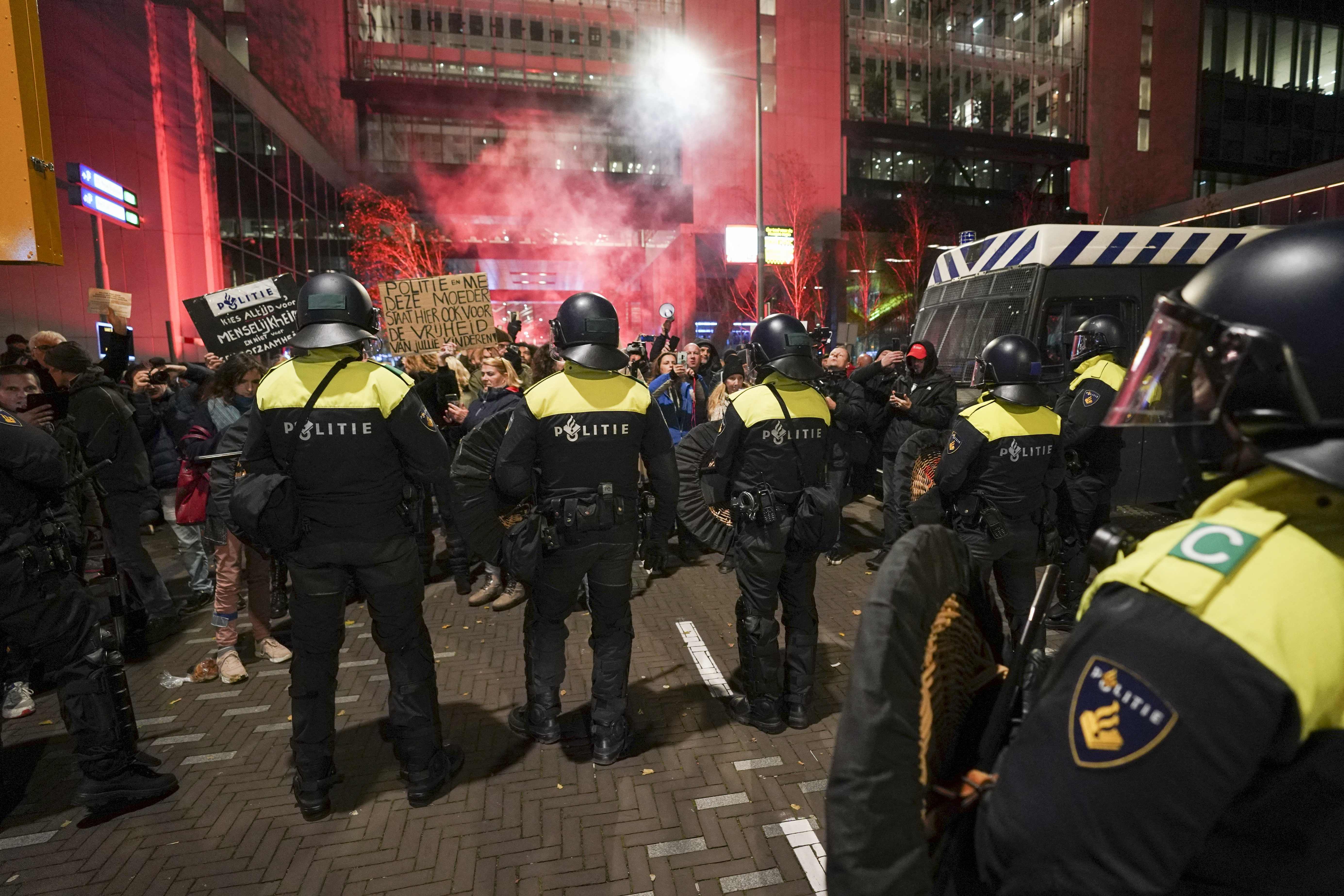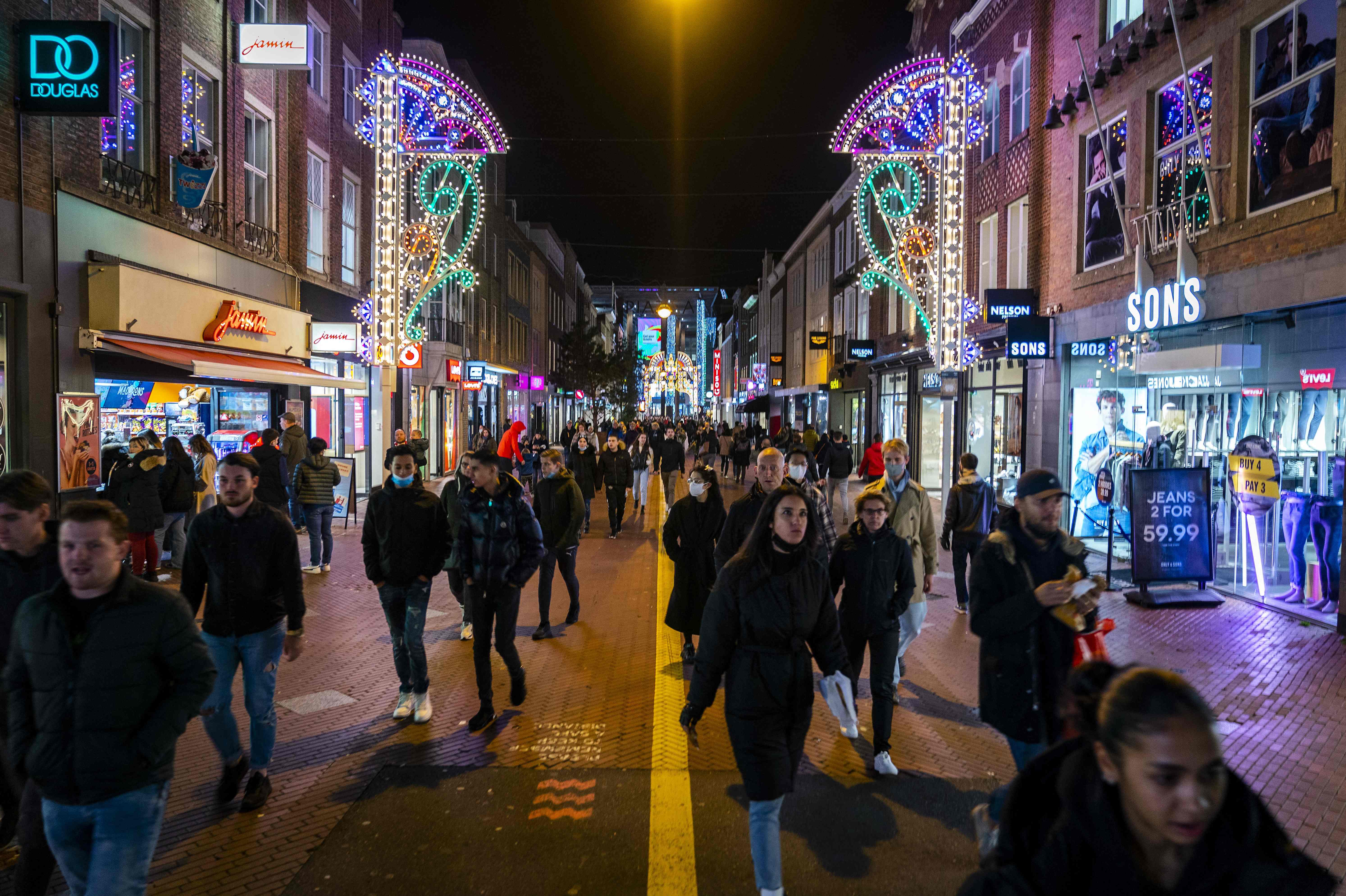
Dutch Prime Minister Mark Rutte has announced Western Europe’s first partial lockdown of the winter, with at least three weeks of Covid curbs on restaurants, shops and sporting events.
Police fired water cannon against hundreds of firework-throwing protesters in The Hague after Rutte unveiled what he acknowledged were “annoying and far-reaching” measures to curb a record spike in coronavirus infections.
The crisis required a “hard blow of a few weeks because the virus is everywhere, throughout the country, in all sectors and all ages”, he told a news conference on national television.
“Fortunately, the vast majority have been vaccinated, otherwise the misery in the hospitals would be incalculable at the moment.”
Bars, restaurants, cafes and supermarkets will have to shut at 8pm for the next three weeks from Saturday, while non-essential shops must shut at 6pm, the government said.
People will be limited to having four visitors at home and have been advised to work at home unless absolutely necessary.
Public events will be scrapped while football matches including the Netherlands’ home World Cup qualifier with Norway next week must be played behind closed doors.
Schools will, however, remain open, and people will be allowed to leave their homes without restrictions.
The government will review the situation on Dec 3 to see if further measures are needed, Rutte added.
These could include requiring Covid passes to access the workplace, and allowing bars and restaurants to limit admittance to people who have been vaccinated or who have recovered from the disease, while excluding those who only have a negative test.
Cases have soared since the Dutch government lifted most Covid measures less than two months ago on Sept 25, reaching a record level of more than 16,000 on Thursday and Friday.
But the restrictions are politically sensitive. Around 200 protesters gathered outside the justice and security ministry during Rutte’s news conference, throwing stones and fireworks at riot police and setting up barricades.
Police then used water cannon to disperse the demonstrators, as loud bangs and chants echoed through the centre of The Hague and mounted police rounded up the stragglers.
The Netherlands suffered its worst riots for four decades in January after the government imposed a night-time curfew to curb a previous Covid surge.
The country of 17 million has reported 2.2 million cases and 18,612 deaths since the start of the pandemic last year.
Hospitals have warned they will not be able to make it through the winter under the current conditions.
The Covid spike comes despite the fact that 82% of Dutch people over the age of 12 have been fully vaccinated.
Unvaccinated people account for most intensive care cases (69%) and hospital admissions (55%), but waning vaccine efficiency, particularly in the elderly, has also been blamed for the surge. (Story continues below)

Pedestrians walk along a street in Eindhoven on Friday evening, ahead of an announcement by the Dutch prime minister that bars, restaurants and shops must close at 8pm. (AFP Photo)
Several European countries are reimposing restrictions in a bid to curb the worrying rise in Covid cases. Governments are also taking more measures to encourage more people to get vaccinated. Here is a Q&A on current conditions:
What is the situation in Europe?
The weekly number of coronavirus cases across Europe has been on the rise since early October and now stands at levels unseen since the start of the pandemic.
Over the past seven days 2,125,775 cases have been registered, a daily average of 303,682, according to an AFP tally based on official figures.
That broke the previous European record of 1,988,507 cases logged in the week of November 2-8 2020.
The latest figures also represent a 13% rise on the previous week.
Five countries — Britain, Germany, Russia, Turkey and Ukraine — logged rises of more than 50%.
It is worth noting that many more Covid tests are being carried out now than was the case when the pandemic first hit the continent in early 2020.
Are all parts of Europe affected equally?
The overall figures hide national differences which are due in large part to differences in the speed of the vaccination roll-out and the social health measures imposed.
In Britain, for example, though Covid cases numbers are on the rise high vaccination rates have kept additional hospitalisations down, said Yves Coppieters, epidemiologist at the ULB university in Brussels.
The same is not true of Eastern European countries, he added.
In countries such as Spain and Portugal, which are very well vaccinated, or indeed Italy which has taken tough measures, the rebound is still not very visible, he added.
France is somewhere in between, with a rise in cases “but less strong” Coppieters told AFP.
On Friday, the European Centre for Disease Prevention and Control (ECDC) said the situation was continuing to worsen in the EU.
Of the 27 member states the centre placed Belgium, Poland, the Netherlands, Bulgaria, Croatia, the Czech Republic, Estonia, Greece, Hungary and Slovenia in the category of highest concern.
How are countries responding to the surge?
For most European nations the main goal is to get as many people vaccinated as possible.
France recently announced that the over-65s must receive a booster jab in order to obtain a health pass.
Some are going further, starting to reinstate some of the restrictions on movement which populations had hoped were over.
The Russian government said Friday it had submitted to parliament two bills that will introduce mandatory health passes to access restaurants and public transport, amid a new wave of coronavirus cases.
Health professionals there will also have to wear masks and be tested for Covid twice a week.
In Austria the government said it wants a nationwide lockdown for those not vaccinated against or recovered from the coronavirus.
Only around 65% of the population is fully vaccinated in Austria, a rate described by Chancellor Alexander Schallenberg as “shamefully low”.
Dutch Prime Minister Mark Rutte announced Western Europe’s first partial lockdown of the winter, with at least three weeks of Covid curbs on restaurants, shops and sporting events.
But a side-effect of the tougher measures could be more public discontent.
Several hundred protesters angered by Rutte’s announcement gathered in The Hague afterwards, with police firing water cannon at them.
Will we see the death rate rise?
Last week the Europe chief of the WHO warned that the current trajectory of Covid in Europe could mean “another half a million Covid-19 deaths” by February.
A daily average of 4,031 coronavirus related deaths have been recorded over the past week — a 10-percent rise on the previous week and an 18-percent rise on the week before that.
A year ago the daily average was 3,785 fatalities.
“We are seeing a wave of infections due to the Delta variant and lower temperatures, but vaccination should prevent a correlation with hospitalisations,” said Coppieters.
“There will inevitably be great heterogeneity between countries depending on vaccination coverage.”
Will vaccinating more people be enough?
No, according to Coppieters.
“The key is of course to vaccinate those most at risk to achieve herd immunity,” he told AFP.
“For the rest of the population, we must above all maintain barrier measures, indoor ventilation and a testing policy,” he added.
Last week the WHO highlighted those methods, calling for continued vaccinations along with widespread use of masks and social distancing measures.